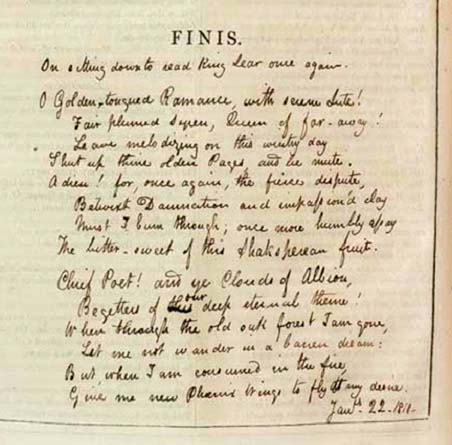Sir Jonathan Bate
When John Keats was feeling lonely and unwell in rented accommodation on the Isle of Wight, he was delighted to find an engraved portrait of Shakespeare in the hallway. His landlady kindly let him take it away when he left. You can just make it out on the wall of his Hampstead home in his friend Joseph Severn’s portrait of the poet reading, with the door to the garden ajar, as if to let in the song of the nightingale. I am sure that he is imagined to be reading Shakespeare.
In one of his letters from the Isle of Wight, Keats wrote to another friend, the manic depressive painter Benjamin Robert Haydon:
I remember your saying that you had notions of a good Genius presiding over you. I have of late had the same thought, for things which I do half at Random are afterwards confirmed by my judgment in a dozen features of Propriety. Is it too daring to fancy Shakspeare this Presider?
Keats went on to hope that the landlady giving him the portrait of Shakespeare was a good omen. Then he dipped into gloom: I am glad you say every man of great views is at times tormented as I am. But Shakespeare was his solace in such times of torment. A little earlier, he had written to his brothers: I felt rather lonely this Morning at breakfast so I went and unbox’d a Shakspeare—‘there’s my Comfort’. The quotation is from Caliban in The Tempest; his comfort was alcohol, whereas for Keats it was Shakespeare.
One day when I was a graduate student at Harvard, I went into the Houghton Library and unboxed the very Shakespeare to which Keats was referring. His own copy of a multi-volume pocket edition, printed in Chiswick in 1814. I traced my hand over his underlinings and marginal annotations. I especially liked the last page of the text of A Midsummer Night’s Dream. Fie, he had written, as he inked out Dr Johnson’s lukewarm comment on the play. And Such tricks hath weak imagination. At that moment, I saw the theme of my doctoral dissertation: a riposte to Harold Bloom’s idea of the ‘anxiety of influence’, with working title Strong Imagination: The Consolation of Influence in Romantic Shakespeare.
Back in England the following year, I went on a wintry day to Keats’s house in Hampstead. I put on the white gloves provided by the curator and opened Keats’s other copy of Shakespeare. Harvard had the boxed edition, but this was a greater prize: John Keats’s facsimile of the First Folio itself. There was a blank half-page at the end of Hamlet, opposite the beginning of King Lear. He had filled it with a poem called ‘On sitting down to read King Lear once again’.
I understood the idea of a compulsion to re-read Shakespeare’s darkest play. For Keats, life was indeed, as he wrote in the poem, a fierce dispute betwixt Damnation and impassion’d clay. Bitter-sweet as the Shakspearean fruit of Lear’s descent into madness inevitably was, the experience of re-reading the play gave him comfort. It turned the embers of his own sorrows to new fire, new creativity, new hope:
Give me new Phoenix Wings to fly at my desire.
Sir Jonathan Bate
21st April 2021




